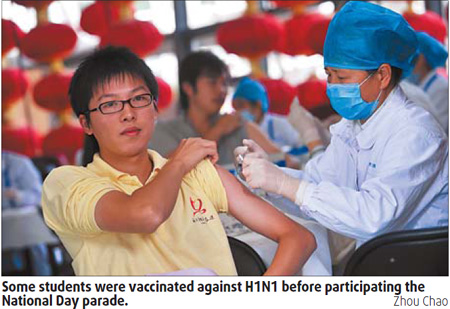
Thousands of Chinese students will be vaccinated against A(H1N1) from today, but many international students don't know if they will be inoculated against the potentially deadly disease.
Zhang Hulan, school doctor from Beijing BISS International School, which has more than 400 international students, told METRO that the school wants students to be vaccinated but it doesn't know where to find the vaccine.
"I have contacted Chaoyang district center for disease control and prevention (CDC) and Beijing municipal education commission, but neither of them know whether or when our foreign students would receive inoculation," she said.
She contacted private clinics such as Beijing International SOS Clinic and Hong Kong International Medical Clinic, but none had the H1N1 influenza vaccine.
Beijing municipal government said it has bought 5 million H1N1 vaccines. Students from Beijing's public primary and middle schools will be inoculated from today, and vaccines for the elderly will start in November.
"Students from international schools are also included in the mass inoculation plan," Wang Yu, office director of Beijing CDC, said, but refused to provide further details.
METRO contacted primary and middle school healthcare centers in Chaoyang and Haidian districts, but staff did not know whether or when international students would be vaccinated.
Wang Yan, principal of Western Academy of Beijing (WAB), said: "Some parents contacted us asking when their children would receive inoculation but unfortunately, so far, we don't have any access to the vaccine."
"Furthermore, Chinese students can receive the seasonal flu vaccination free of charge, but our students have to pay for it."
On Sept 14, four students from the Korean International School established by the Embassy of the Republic of Korea in China were infected with H1N1. The school was closed for a week. The four students have since recovered and returned to school.
Cui Xiaoyu, a teacher at the school, said that due to its H1N1 infection history, the city authorities have given "special treatment" to the school and students will be vaccinated in one week.
Some medical experts suggest that as the weather cools the risk of an H1N1 flu outbreak will increase.
China issued an order for mass inoculation on Sept 8 after approving vaccines produced by several domestic pharmaceutical companies. About 39,000 residents in the city were inoculated by Sept 24, with 14 cases of adverse reaction.
According to figures released by Beijing municipal health bureau, 418 cases of HIN1 flu had been reported in Beijing, including eight people from Hong Kong, Taiwan and overseas.
(China Daily 10/20/2009 page25)


